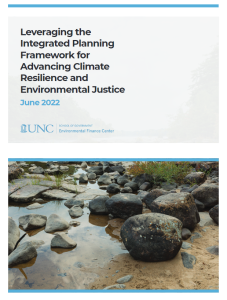Climate change is causing increases in both total precipitation volume and precipitation intensity. A warming climate also causes seawater to expand and ice over land to melt, contributing to sea level rise. These changes in global patterns increase the frequency and severity of storm surges and coastal flooding, causing serious damage to critical public water infrastructure. For both municipal separate stormwater systems (MS4) and combined sewer systems, increased rainfall will produce increased storm runoff, which can exacerbate existing or introduce new pollution problems. Stormwater can overwhelm storm sewer systems, especially in an era of faster, more frequent, and more intense wet weather events. Uncontrolled stormwater runoff can cause urban flooding and threats to the human-built environment.
Lower income communities, particularly communities of color, already face disproportionate impacts of stormwater flooding including sanitary sewer backups in basements flood exposures, disaster damage outcomes from heavy rainfall events, economic impacts, and efforts to build resilience. Those impacts are only expected to worsen with climate change.
EPA’s Integrated Planning Framework offers great opportunities for municipalities to incorporate climate change and/or environmental justice concerns into a holistic long-term plan. The stakeholder engagement, alternatives selection, and project prioritization processes that are central to the framework allow local governments to incorporate equity, resiliency, and climate change into a plan designed to address Clean Water Act goals.
This report provides case studies of how communities have addressed climate change and environmental justice challenges using the integrated planning framework.
Download The Resource



